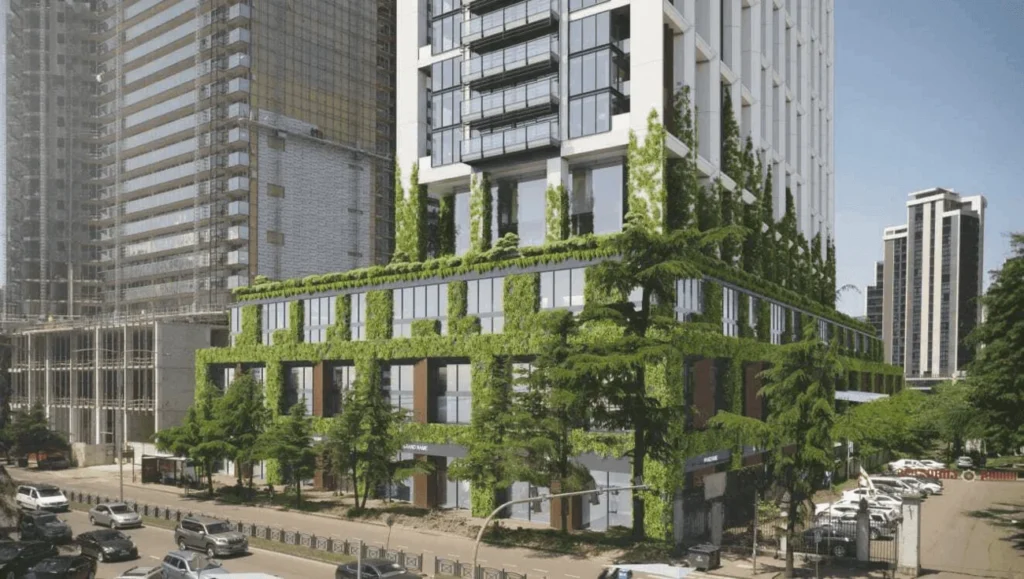Rental rates and price dynamics
The Georgian rental market, particularly in key cities such as Tbilisi and Batumi, has undergone significant changes over the past few years. These changes are driven by both internal economic factors and external developments such as migration and increased tourism.
General market picture
In previous years, rental prices in Georgia have risen sharply. This was due to increased demand from migrants and tourists. For example, in Tbilisi, the average cost of renting a one-room flat in the city centre was as high as $500-$600 per month. However, the market started to stabilise. According to TBC Capital data, the average rental rate decreased by 10% compared to the previous year.
Price dynamics in Tbilisi
Tbilisi, as the capital and business centre of the country, shows unique trends in the rental market. Flat rents in Tbilisi remained relatively stable despite the overall decline. The average rental price in popular neighbourhoods such as Saburtalo and Vake was around $450 for a one-bedroom flat. These neighbourhoods attract both locals and expats, which keeps demand high.
Situation in Batumi
Batumi, a resort town on the Black Sea coast, shows a different picture. Here rental prices depend on seasonality. The summer tourist season traditionally raises the rates. Flat rent on the seashore of Batumi at the height of the season reached $700-$800 for one-room housing. However, in the off-season these rates significantly decreased, which indicates the high volatility of the market.
Real estate in Georgia
Rental yield
Long-term rental yields in Georgia are as follows 9-10% p.a.. This makes investing in Georgian property for rent attractive to both local and foreign investors. It is important to note that short-term rental yields may be higher, but involve greater risks and costs.
Forecasts and expectations
Experts predict that Georgia's rental market will remain stable in the coming years. The demand for rentals in Tbilisi and Batumi is expected to continue to grow, supported by the influx of migrants and tourists. At the same time, landlords should be prepared for possible price fluctuations and adapt their strategies according to the changing economic situation
Thus, rental rates in Tbilisi и rental prices in Batumi remain key indicators for landlords seeking to maximise rental income in Georgia.
Portrait of tenants (tourists, migrants, digital nomads)
Georgia attracts a diverse audience of tenants due to its unique geographical location, loyal visa regime and relatively low accommodation prices. In recent years, several key groups of tenants have been driving demand for rental accommodation in Georgia.
Tourists
Tourism in Georgia is developing rapidly, and more than 7 million foreign travellers have recently visited the country. Tourists often choose short-term rentals, preferring flats and flats in the centre of Tbilisi or by the sea in Batumi. For them, such factors as convenient location, proximity to attractions, developed infrastructure and availability of modern amenities are relevant.
The average cost of short-term rentals in popular tourist areas is $50-$100 per day. These areas are particularly attractive due to the ability to easily access major tourist sites and numerous restaurants and cafes.
Migrants
Migrants who have arrived in Georgia in recent years, especially due to the events in Ukraine, make up a significant proportion of tenants. According to official data, about 100,000 Russians have chosen Georgia for long-term residence. For them, the availability of developed infrastructure, access to public transport and proximity to educational institutions are relevant.
Migrants prefer long-term rentals in quiet and accessible neighbourhoods such as Saburtalo and Vake in Tbilisi. These neighbourhoods offer comfortable conditions and developed infrastructure, which makes them attractive for families and professionals. The average cost of renting a one-bedroom flat here varies $400 to $600 per monthThis makes them accessible to most migrants.

Digital Nomads
Digital nomads, are becoming an increasingly prominent group of renters in Georgia. They value not only a low cost of living and the ability to work remotely, but also access to stable internet, which is critical to their work. Georgia offers convenient conditions: a developed network of co-working spaces and easy visa processing make the country attractive for remote workers. Flexible rental conditions and the ability to quickly change their place of residence are also important for them. Digital nomads often choose to rent flats in Tbilisi, where the average cost of accommodation varies $500 to $700 per month depending on the neighbourhood and conditions.
Foreigners and remote employees
Foreigners working in international companies and remote workers are increasingly choosing Georgia for long-term residence. They are attracted not only by the cultural diversity and hospitality of the locals, but also by the opportunity to integrate into the international community. Such factors as access to quality internet services, security, developed infrastructure and proximity to business centres are important for them. These tenants prefer spacious flats in upscale neighbourhoods such as Saburtalo and Vake, where rents can be as cheap as $800-$1000 per month.
The diversity of tenants in Georgia creates a dynamic and multi-faceted market. Landlords need to consider the needs of each of these groups to effectively manage their properties and optimise rental income. Demand for rent in Tbilisi и demand for rent in Batumi remain high, which opens up a wide range of opportunities for investment and development of rental business.
Lease terms and taxation
Rental relations in Georgia are characterised by simplicity and flexibility, which makes the country attractive for both tenants and landlords. Let's consider the main aspects to be taken into account when renting out accommodation in Georgia.
Rental terms and conditions
In Georgia, a lease is usually for a term of several months to a year with an option to renew. Standard collateral is the equivalent of 1-2 months' rent. For example, if the cost of renting a flat is $500 per month, the deposit can be from $500 before $1000. This approach provides the lessor with protection against potential losses.
Leases in Georgia contain several key provisions that both tenants and landlords need to consider.
- The amount of rent and payment terms: Rent is usually paid on a monthly basis. This helps to maintain a steady financial flow for the landlord. It is important that the contract clearly states the amount and date when the rent is due. For example, payment may be required by the 5th of each month.
- Utility Liability: These costs can be included in the rent or paid separately. The contract should clearly specify which utilities (electricity, water, gas, internet, etc.) are to be paid by the tenant. This helps to avoid misunderstandings and unexpected costs.
- Terms and conditions for cancellation of the contract: Generally, a 30-day notice is required before terminating the lease. This provision protects both parties, allowing the landlord to find a new tenant and the tenant to prepare to move. It is important that the contract spells out all the terms of termination, including possible penalties or deductions from the security deposit in the event of early termination.

Taxation
Georgia's tax system makes renting out homes attractive to homeowners. Income tax on rental income is fixed at the level of 5%. This applies to the letting of residential property to individuals, regardless of the length of the tenancy. For registered landlords, this is often the only tax, which greatly simplifies the process and reduces administrative costs.
Example of tax calculation: If a landlord receives $6000 per year from letting a home, the tax will only be $300.
The benefits for landlords in Georgia make the property market attractive and available for investment.
- Ease of registration: Registering as a landlord does not require complicated procedures, making it easy to start a rental business.
- Minimum tax liability: A flat tax rate simplifies financial planning, allowing landlords to easily forecast income and expenses.
- Flexibility in lease terms: An important advantage is Ability to adapt lease terms depending on tenants' needs. This means that the landlord can modify the lease terms, payment terms and other aspects of the agreement to better suit the requirements of different groups of tenants. For example, short-term leases with renewal options can be offered to digital nomads, while long-term tenants can be offered more favourable terms and discounts. This flexibility helps to attract more customers and minimise the risks of downtime.
The lease terms and tax system of Georgia create favourable conditions for the development of the rental business. Renting accommodation to foreigners in Georgia is becoming increasingly popular due to the ease of processing and low taxes. This opens up a wide range of opportunities for owners looking to maximise income from their property.
Legal aspects (contracts and rights of the parties)
The legal side of renting a home in Georgia plays a key role in ensuring the rights and obligations of both tenants and landlords. Understanding these aspects helps to avoid misunderstandings and promotes civilised resolution of disputes.
Lease agreement
Conclusion written lease is an important step in the lease process, providing protection and clarity for both parties. Such an agreement should include several key elements that will help avoid misunderstandings and conflicts.
- Rent amount: The contract clearly states the amount and timing of payment. For example, renting a flat for $500 per month should have clear terms about the date by which payments must be made. This allows both parties to plan their finances and avoid delays.
- Lease termThe lease is usually for a period of a few months to a year, with the possibility of renewal. This gives tenants the security of tenancy and landlords the security of income.
- Obligations of the parties: The contract should include the responsibilities of the tenant and the landlord, including responsibility for utilities, repairs and maintenance. This helps to clearly assign responsibilities and avoid disputes over additional costs.
- Terms of cancellation: Usually 30 days' notice is required before the lease is terminated. This provision protects both parties by allowing the landlord to find a new tenant and the tenant to prepare to move.
Though. notarisation The contract is not mandatory, but can serve as an additional defence for both parties, confirming the legality and correctness of all terms and conditions.
Rights and obligations of lessees
Tenants in Georgia have significant protections through legislation that ensures their rights and residential stability. These regulations help create fair conditions for both parties to the lease.
- Right to timely notice of termination of contract: Landlords are required to give tenants 30 days' notice, usually 30 days, to end a long-term tenancy. This allows tenants to prepare for the move and avoid sudden changes in their housing situation.
- Sudden eviction without a court order is inadmissible: This provision provides stability and certainty for tenants by protecting them from arbitrary actions by landlords.

- The right to use the accommodation in accordance with the terms of the contract: Tenants have the right to use the accommodation as agreed in the tenancy agreement. This includes access to the accommodation, use of utilities and fulfilment of all the conditions stipulated in the contract.
- Protection against unjustified rent increases: The legislation protects tenants from sudden and unreasonable rent increases, giving them confidence in their financial stability.
These rights help to maintain a balance between the interests of tenants and landlords, promoting a civilised and fair resolution of any issues that arise.
Rights and obligations of landlords
Landlords in Georgia have certain rights and responsibilities that help them manage properties effectively and protect their interests.
- The right to receive rent on time: Landlords have the right to demand timely payment of rent, which ensures a stable cash flow and allows for planning of further investments and expenditures.
- Entitlement to compensation in case of damage to property: If a tenant damages the property, the landlord is entitled to compensation for repairing or replacing damaged items. This provision protects the landlord from financial loss and encourages tenants to take good care of the property.
- Possibility to terminate the agreement in case of breach of lease conditions: Landlords can terminate an agreement if a tenant violates its terms, such as non-payment of rent or misuse of the property. This allows landlords to react quickly to problem situations and minimise risks.
These rights and responsibilities help to maintain a balance between landlords and tenants, ensuring a successful and mutually beneficial co-operation.
The legal aspects of renting a home in Georgia provide protection and stability for both tenants and landlords. Lease agreement in Georgia is an important tool for regulating relations and preventing conflicts. Respect for the rights and obligations of each party contributes to successful and long-term co-operation.
Regional differences in the rental market (Tbilisi, Batumi, etc.)
The rental market in Georgia shows significant variation from region to region. Each city offers unique opportunities and challenges for landlords and tenants, making local understanding a key factor in successful property management.
Tbilisi
Tbilisi, as the capital and business centre of Georgia, offers a wide range of opportunities in the rental market. The city attracts both locals and foreign expats, ensuring a steady demand for property.
- High demand: Tbilisi is an attractive destination for expats and IT professionals. This is due to the presence of many international companies and start-ups, which keeps a constant interest in renting accommodation.
- Stable prices: Unlike other regions, there are insignificant fluctuations in rental rates throughout the year. This provides predictability and stability of income for landlords. The average rental price for a one-bedroom flat in popular neighbourhoods such as Saburtalo and Vake is $450-$600 per month.
- Developed infrastructure: Proximity to business centres, offices and educational institutions makes renting in the city centre particularly in demand. This provides tenants with convenience and comfort, and owners with a high occupancy rate.
These features make Tbilisi attractive to investors looking for stable and long-term property investments with guaranteed demand.
Batumi
Batumi, located on the picturesque Black Sea coast, offers unique opportunities for landlords due to its seasonal nature of the rental market. This makes the city particularly attractive during the summer months.

- Seasonality: The summer tourist season significantly increases the demand for rentals. At this time, rental rates can increase significantly, allowing owners to earn a higher income. Renting a flat on the seaside during the peak season can reach $700-$800 per monthThis is a significant increase compared to the off-season.
- Tourist attraction: Batumi attracts foreign tourists due to its beaches, cultural attractions and developed infrastructure. This creates a constant flow of tenants interested in short-term stays, making the rental market dynamic and lively.
- Possibility of high profitability: Due to high seasonal demand, rental yields in Batumi can be as high as 12% per year. This makes investing in local property particularly lucrative for those looking to maximise their returns.
These features make Batumi attractive to investors who are willing to adapt to seasonal fluctuations and capitalise on the opportunities of high tourist demand.
Other regions
Cities such as Kutaisi and Bakuriani have a less developed rental market compared to Tbilisi and Batumi, but this offers unique opportunities for certain groups of tenants and landlords.
- Low rental rates: These regions have significantly lower rental costs, which makes them attractive to students and employees of industrial enterprises. For example, rents in Kutaisi can amount to $300-$400 per monthwhich is affordable for locals and those looking for economical accommodation options.
- Less competition: Unlike larger cities, there are fewer landlords and offers, which can be an advantage for property owners. This makes it easier to find tenants and establish stable relationships without the pressure of a large number of competitors.
- Specific demand: The proximity to universities and industrial sites creates a specific rental demand. Students and employees of companies are often looking for accommodation in close proximity to their place of study or work, which makes such properties particularly sought after.
These features make regions such as Kutaisi and Bakuriani attractive to investors looking for stable and predictable rental income.
Understanding the regional differences in the Georgian rental market allows property owners to tailor their strategies and maximise income. Rent in Tbilisi и rental in Batumi differ in the nature of demand and yields, which should be taken into account when planning investments and property management.
Conclusion
The Georgian rental market offers a wide range of opportunities for property owners seeking to optimise income and adapt to changing economic conditions. The diversity of tenants, including tourists, migrants and digital nomads, creates a dynamic environment in which it is important to take into account regional specificities and legal aspects.
- Stabilising rental rates: After a period of growth, the market is gradually normalising, which opens up new opportunities for long-term investments.
- Tenant diversity: Understanding the needs of different tenant groups helps landlords to manage their properties effectively.
- Flexible lease terms: The simplicity of contracts and favourable tax system make Georgia attractive for landlords.
- Regional differences: Each city offers unique conditions and it is important for owners to adapt their strategies according to local circumstances.
Ultimately, successful rental property management in Georgia requires careful market analysis, an understanding of tenant needs, and a sound approach to legal and tax issues.
We offer individual selection of property for purchase, taking into account all your wishes and requirements. Our team of experts is ready to help you find the perfect property, be it a flat in the centre of Tbilisi or a cosy house on the coast of Batumi. Leave a request on our website and we will contact you as soon as possible to discuss all the details and offer you the best options on the market.









